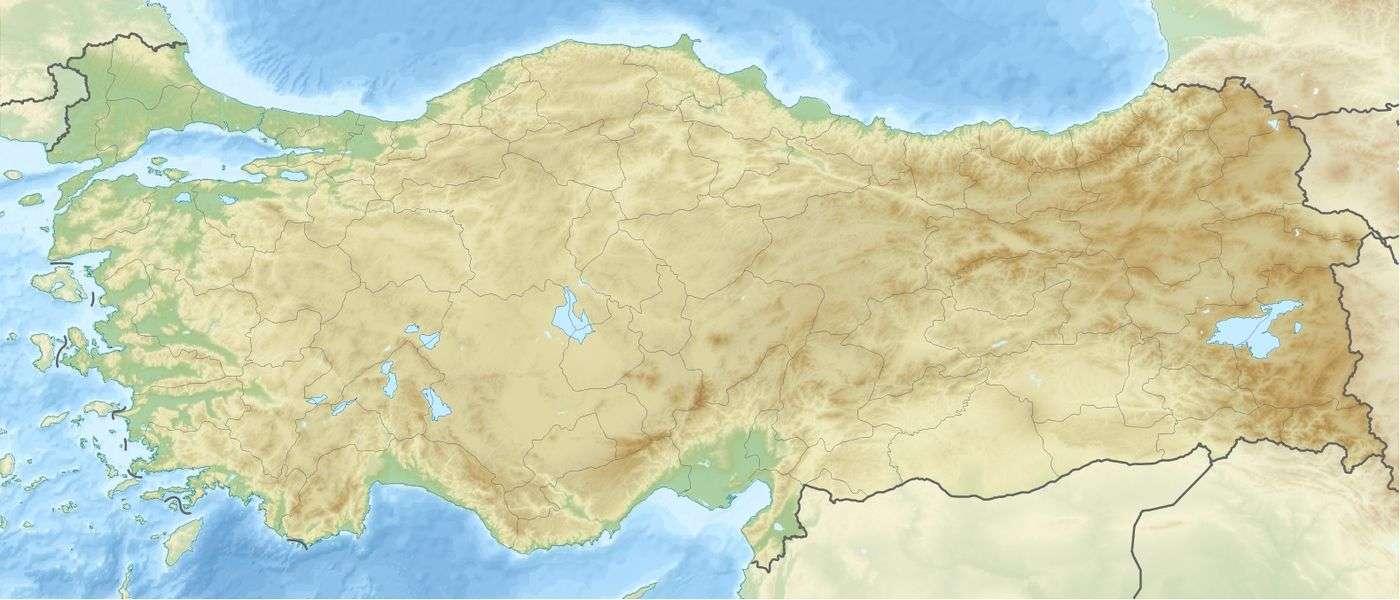1957 Fethiye earthquakes
 Fethiye | |
| Date | April 24–25, 1957 |
|---|---|
| Magnitude |
7.1 (April 24) 7.3 (April 25) |
| Depth | 35.0 km |
| Epicenter | 36°29′35″N 28°49′44″E / 36.493°N 28.829°E36°24′18″N 28°41′56″E / 36.405°N 28.699°ECoordinates: 36°24′18″N 28°41′56″E / 36.405°N 28.699°E |
| Areas affected | Turkey Fethiye, Muğla |
| Casualties | 19 dead |
The first of the 1957 Fethiye earthquakes occurred on April 24, 1957, with the second and larger event about seven hours later on the following day. Both earthquakes had epicentres in the eastern Mediterranean between Rhodes and the coastal city of Fethiye in Muğla Province, southwestern Turkey.[1]
Tectonics
As noted by a scientist from Istanbul Technical University, the tectonics of the Aegean Region of Turkey, which incorporates many faults, produces earthquakes frequently. The quakes can reach magnitudes up to 7.2 with aftershocks of 5.1. A geological fault in the southern part of the region stretches from the Greek island of Rhodes northeastwards to Burdur and passes close to the vicinity to Fethiye.[2]
Earthquake characteristics
The first earthquake hit at 21:17 hours local time on April 24, 1957 and lasted 25 seconds having a magnitude of 7.1 on the moment magnitude scale; a stronger second quake occurred at 04:26 hours on April 25; this one lasted for 60 seconds and had a magnitude of 7.3.[1][3][4][5] The earthquakes also shook many locations around Fethye, the epicenter, including Isparta, Burdur, Tefenni, Acıpayam, Denizli, Nazilli, Aydın, Yatağan, Milas, Bodrum, Ödemiş, Muğla, Marmaris, Köyceğiz, Kaş and Finike as well as the Greek islands of Kos, Symi and Rhodes.[6]
Damage and casualties
Around 1,500 structures, including public buildings such as schools, hospital, prison, gendarmerie station, community health center and city hall, were damaged. The number of affected people was around 8,000. A 5–6 m (16–20 ft) section of the harbor quay broke away and sank into the sea, and asphalt road surfaces split and cracked. The earthquake ruined almost the entire city, with 90% of buildings being damaged.[5] Thanks to the strict evacuation order of the district governor Nazif Okuş after the first quake, the number of dead remained at only 19 for the city and the villages around with a total population of around 60,000.[1][5] According to another source, a total of 67 people were killed, 27 in the city and in its villages, 40 in the surrounding districts.[6]
Telecommunications were interrupted as the telephone lines broke, but communications were restored two days later by the use of field telephones.[1]
Aftermath
The first actual relief came on April 26 from the Turkish Red Crescent (Turkish: Kızılay) with 2,500 blankets, 1,350 tents and a field hospital. President Celal Bayar, Prime Minister Adnan Menderes and high government officials visited the disaster region on April 28.[5] Wreck removal works were hampered by uninterrupted rainfall.[1]
On April 29, a warship of the British Mediterranean Fleet delivered 2,000 blankets, 500 tents, medicine and food to the earthquake victims in Fethiye.[1]
Commemoration
In 2013, the mayor of Fethiye held a commemoration event featuring a photography exhibition.[6]
References
- 1 2 3 4 5 6 Erken, Nurdeniz & Erdoğan Öztürk (June 13, 2012). "Fethiye'nin kaderini değiştirdi". Sabah (in Turkish). Retrieved January 19, 2016.
- ↑ "Fethiye'de şiddetli deprem". Sabah (in Turkish). June 10, 2012. Retrieved January 19, 2016.
- ↑ "M7.1 – Dodecanese Islands, Greece". United States Geological Survey. Retrieved January 21, 2016.
- ↑ "M7.3 – Dodecanese Islands, Greece". United States Geological Survey. Retrieved January 21, 2016.
- 1 2 3 4 "Fethiye'de 55 yıl önceki depremin görüntüleri ortaya çıktı". Zaman (in Turkish). June 11, 2012. Retrieved January 19, 2016.
- 1 2 3 "1957 depremi için anma etkinliği düzenlendi". Hamle (in Turkish). Retrieved January 19, 2016.